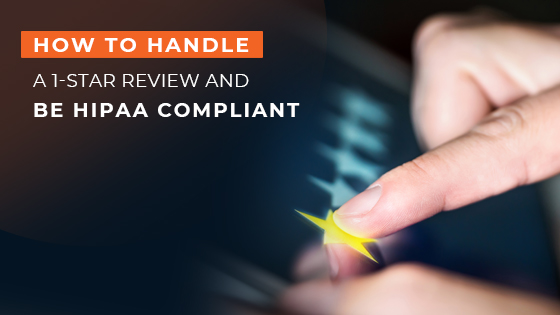

Occasionally, an unhappy patient will leave a 1-star review online. How you respond to a negative review matters a lot. A recent survey from Press Ganey revealed that most patients read online reviews when selecting a healthcare provider. By properly addressing a poor review, you’re more likely to win your patient back, change prospects’ opinions about your practice, and attract new patients. At the same time, it’s critical to leave HIPAA-compliant responses to avoid harsh penalties.
Keep reading to learn more about HIPAA and how to leave effective responses that don’t violate HIPAA.
Health Insurance Portability and Accountability Act of 1996, or HIPAA, is a set of guidelines that safeguard patients’ personal health information (PHI). The act limits medical professionals in how they interact with their patients online.
PHI is health information that can be used to identify a person. It includes a patient’s identity and physical or medical condition. Acknowledging or referencing a patient’s PHI is a potential breach of HIPAA and may cost you between $100 to $50,000 in fines.
HIPAA covers online review management. And because responding to 1-star reviews is crucial to your online reputation, you must follow HIPAA rules when addressing feedback.
Here are tips to ensure HIPAA-compliant responses to 1-star reviews.
You should never be impulsive when responding to a negative review. An outburst can dent your online reputation even more than the 1-star review. So always maintain a professional tone and avoid appearing defensive.
Show appreciation for any review you receive, whether good or bad. A simple ‘thank you’ tells the patient that you take reviews seriously and that you’re concerned. Besides, a 1-star review can inspire change and help you to further improve the patient experience.
Also, ensure you respond to reviews within 24 to 48 hours to demonstrate that you care about patient satisfaction. Patients typically expect to get a resolution, and the longer you delay, the more it might seem like you don’t care.
By responding quickly, you can avoid staining your hard-earned reputation and damaging your relationships with your patients.
You have a legal and moral obligation to protect PHI when responding to reviews. Therefore, don’t mention any details about the patient’s name, phone number, visit, diagnosis, test results, condition, or treatment. Additionally, don’t confirm or deny the reviewer as your patient.
Keep the patient’s privacy intact at all times when responding publicly. Even if the reviewer has disclosed personal details about themselves, their visit, or the treatment provided, don’t acknowledge it.
Give broad responses such as, “Thank you for taking the time to leave us feedback as it helps us improve our patient experience. Please get in touch with our office at (email address or phone number) to further discuss your experience.”
Urge the reviewer to contact your office directly. Taking the conversation offline helps diffuse the situation. It also prevents further online conversations that could breach HIPAA rules. Unlike an online exchange, a one-on-one conversation is the best way to handle a negative review and turn a bad situation around.
Remember never to contact a person who gave a poor review without consent. It could be seen as harassment. Let the reviewer get in touch with you or willingly provide a way to do so. That way, your intentions won’t be misinterpreted.
Together with your team, create a list of responses that address different scenarios for 1-star reviews. You can have a legal advisor assess your responses to ensure you’re HIPAA-compliant. A library of pre-canned, HIPAA-compliant responses will save you a lot of time and trouble.
A 1-star review is not always permanent. It can be an opportunity to show you’re committed to providing second-to-none customer service and win back the patient.
After successfully resolving an issue, invite your patient to re-review your practice. Taking proactive steps to fix a patient’s complaint can encourage them to update the bad review and share how you made things right. Indeed, 89 percent of consumers are willing to change a bad review, depending on how you address the less-than-stellar review.
With MDidentity, you can stay on top of all your reviews and catch 1-star reviews early. MDidentity allows you to request reviews, monitor feedback, and provide timely responses, all from a central dashboard. In turn, that will increase patient satisfaction, boost your online reputation, and help you score new patients.
Want to keep tabs on your reviews and ensure patients receive timely responses? Request a demo today to find out how MDidentity can help.

619 Brighton Ave. 202B
Portland, ME 04102